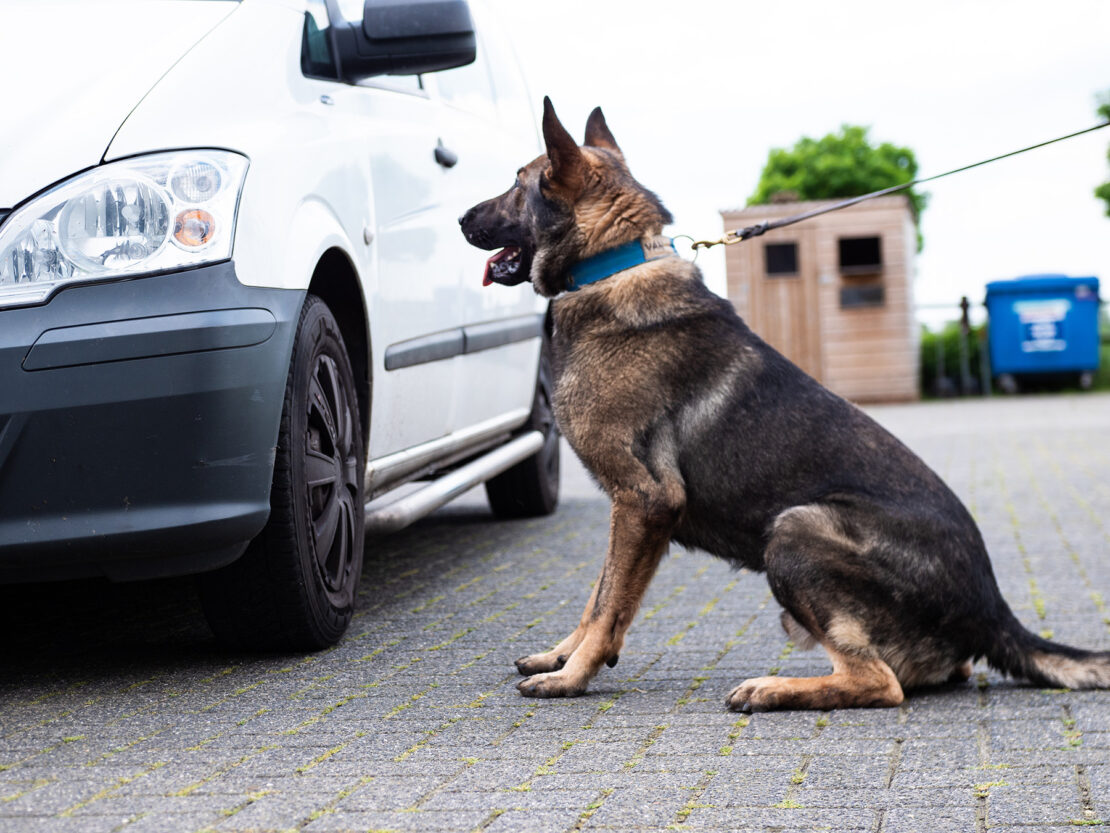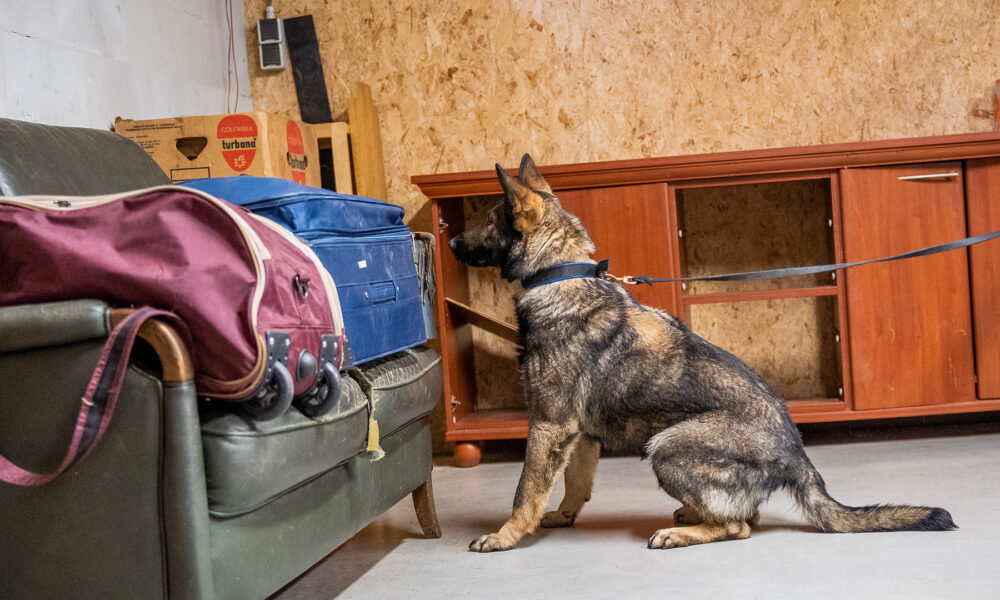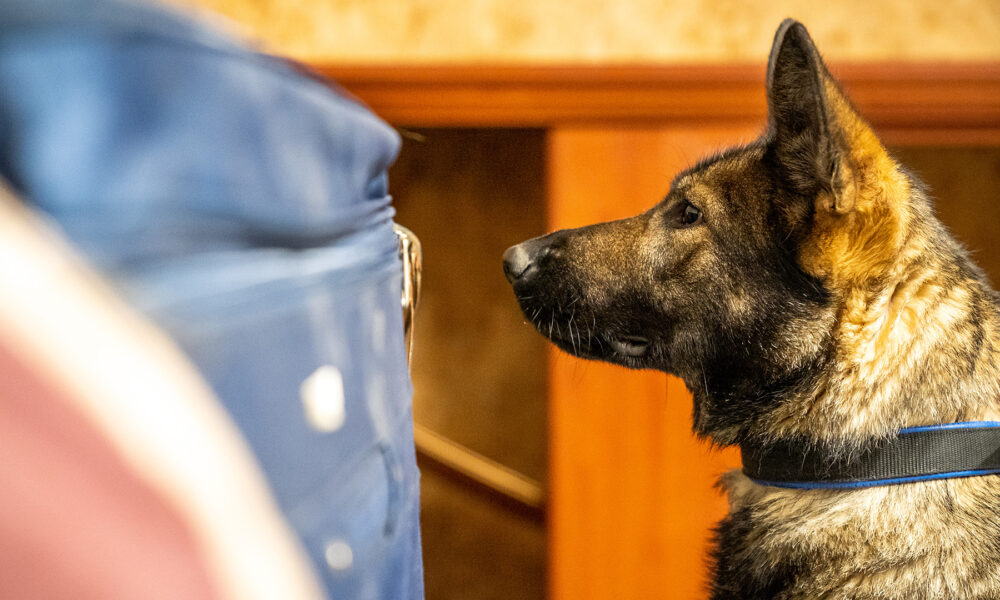Traditionally, the most general EDD (sometimes referred to as “standard” EDD) is a dog that searches an array of areas at the immediate direction of a handler, most often but not exclusively on lead. Such areas include the interior and exterior of varied types of buildings, road vehicles, limited open areas (e.g., a park), and articles such as luggage and boxed goods.
More specialized EDD dogs applications are extensions of these general tasks and are often more focused on a particular search task, the context in which that search occurs, or the mode by which that search is performed.
As mentioned, specialization is increasing as a consequence of the growing sophistication of EDD dogs applications with some fairly well-defined specialties.

For example, Person/Body-Borne Improvised Explosive Device (PBIED/BBIED) EDDs interrogate persons or their aerodynamic wake, such as TSA Passenger Screening and Vapor Wake canines, respectively.
Specialized Search Dogs (SSD) and similar variants are remotely-directed dogs working off-lead and down-range, primarily but not exclusively for military applications in detecting IEDs. Variants of the SSD include specific main route (i.e., roadway) clearance and land-mine EDD dogs.
Some specializations are less well-recognized at this time, but becoming increasingly defined by the search task to be performed, such as cargo screening. Of course, many military working dogs (MWD) and law enforcement EDDs are dual-purpose or multi-purpose canines employed for multiple tasks including protection/apprehension or tracking, but these additional tasks are beyond the scope of this review; suffice to say that some specialty EDD tasks, such as the screening of persons, may be less compatible with dogs having the propensities necessary to perform these additional non-EDD tasks.
Specialization may be contextual in nature requiring that dogs exhibit characteristics particularly well-suited for working in particular conditions. This may be the case, for example, of EDDs for maritime operations working on and transferring between vessels, working in the confined spaces of those vessels, and in the loud environment of the engine rooms of those vessels.
Some dogs that may not be behaviourally well-suited for particular tasks may possess very suitable characteristics for other tasks. For example, dogs unable to work in large crowds of people may be capable of specializing in interrogating cargo, where other characteristics, such as the ability to search vigilantly for long durations, has primacy.
Some search tasks can also be delineated by the required concentration of explosive odour to be detected. For instance, for EDDs in the aviation security sector, trace levels of explosives are important to detect as compared to the SSD dog in a combat theatre that may, in some circumstances, need to be conditioned to ignore trace levels of explosives.
Such parameters may translate to the intrinsic propensity of a dog to engage in meticulous sniffing without which it may be difficult to condition it to detect trace levels of explosives or the PBIED EDD that may require an intrinsic propensity for air-scenting behaviour as contrasted with ground- or object-scenting to perform the task successfully.
In the current security climate, the use of explosive detection dogs or sniffer dogs is becoming increasingly more in demand from many industry sectors. The benefits of utilising detection dogs (sometimes called bomb dogs, sniffer dogs), to increase the protection of your staff and premises are tangible in that that they are effective, efficient and extremely versatile.
Specially trained dogs can be used to detect explosives using their noses which are very sensitive to scents.
These dogs are trained to identify the scents of explosive materials and notify their handler when they detect one of these scents.
The dogs indicate the source, by taking generally a passive response, such as a sit, down, stand and stare to alert the handler of the presence of a target substance.
How are dogs trained to detect explosives ?
Explosives detection dog teams (EDDTs)
Our EDD teams can be widely used across different areas.
- Vehicles
- Buildings
- Routes
- Open Areas
- Rummage searches
- Baggage
- Body borne – passive screening
The dogs can either be classed a green, suitable for the client to train as an EDD through to being totally trained for explosive detection work with basic obedience. Indication is done by letting the dogs take ‘a sit’ position after detecting explosive material.
What explosives can dogs detect ?
Our explosive detection dogs are trained on 12 basic odours, which allows them to detect IEDs (Improvised Explosive Devices) of different types and compositions of explosives.
Best breeds for explosive detection dogs
Police Dogs Centre Holland offers different breeds of dogs that can be used as explosive detection dogs. The most common breeds used are :
- Belgian Malinois
- German Shepherd
- Dutch Shepherd
- Labrador Retriever
- German Pointer
- Beagle
- Springer Spaniel







